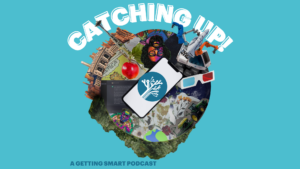Envisioning the Future of Education and Jobs

The new year has begun with a flurry of activity from the World Economic Forum and the Organisation for Economic Co-operation and Development that provides a blueprint for education and business leaders concerned with the future of work.
In September, the WEF published the Future of Jobs Report 2018 and it’s now a hot topic at the annual gathering of business leaders at Davos. The report noted the following:
“By 2020, more than a third of the desired core skill sets of most occupations will be comprised of skills that are not yet considered crucial to the job today … Overall, social skills — such as persuasion, emotional intelligence and teaching others — will be in higher demand across industries than narrow technical skills, such as programming or equipment operation and control. In essence, technical skills will need to be supplemented with strong social and collaboration skills.”
The report cited four drivers of this change:
- Ubiquitous high-speed mobile internet
- Artificial intelligence
- Widespread adoption of big data analytics
- Cloud technology
In order to prevent what the WEF calls a lose-lose scenario — technological change accompanied by talent shortages, mass unemployment and growing inequality — the authors argue that business and education leaders must take an active role in assisting existing workers via re-skilling and up-skilling. Leadership must be supported by individual agency – the WEF calls on individuals to take a proactive approach to the same process and focus on lifelong learning.
At Davos, the OECD published Envisioning the Future of Education and Jobs: Trends, Data and Drawings. This report is the result of a collaboration between the OECD and Education and Employers, a non-profit in the United Kingdom that focuses on connecting primary and secondary schools with employers and volunteers. The underlying call to action in this report asks education and business leaders to work in concert “to help broaden young people’s horizons, raise their aspirations, and provide them with the vital work-related knowledge and skills that will help them as they make the transition from school to work.”
The OECD report is structured around six themes, each of which is launched by compelling statistics, and concludes with essential questions:
- GLOBALIZATION: How can education systems better prepare for the inflow of students from various backgrounds, socio-economic classes and cultures? Are our education and labor systems able to adequately recognize prior learning and qualifications?
- ENVIRONMENTAL SECURITY: How can education systems help young people develop a greater awareness of the connections between their daily decisions and possible long-term consequences, not just for themselves but for society as a whole? What kinds of jobs will a more environmentally sensitive economy need, and what is the best way to prepare students for them?
- DIGITALIZATION: What are the media and digital literacy skills that citizens need to navigate through “digital” democracies? Is digital citizenship different from its traditional form?
- THE 4TH INDUSTRIAL REVOLUTION: Does education foster and value the creativity necessary to be innovative?
- LIFELONG LEARNING: Should some form of lifelong learning be compulsory? Should lifelong learning be a right?
- COLLABORATION AND CO-OPERATION: In a world in which most people will have to collaborate with people from different cultures, do education systems have an obligation to help young people learn how to appreciate a range of ideas and perspectives – some of which may be far from their own?
The data, projections and recommendations in Envisioning the Future of Education and Jobs: Trends, Data and Drawings are coupled with insights from the Drawing the Future survey, which asked 20,000 students (ages 7-11) from around the world to draw a picture of the job they want to do when they grow up. The illustrations are supported by a series of questions (mostly drawn from UK respondents) that sought to determine youngsters’ understanding of the future of work.
It should come as no surprise that the survey results revealed a yawning gap between the world of work students can imagine today and what economic projections suggest will be the reality in the near future. Their misapprehensions are no different than those held by adolescents (Nothing in Common report) or adults. The authors tartly noted that there was “nothing in common” between career aspirations and projected labor market demands. That finding serves as an additional impetus for increased focus on work-embedded education, career technical education, internships, apprenticeships, and community service that is driven by economic data.
The OECD report concludes with an aspiration that is sure to generate a thousand discussions because it is so tightly bound to one of our greatest fears: “The future will be about pairing the artificial intelligence of computers with the cognitive, social and emotional capabilities of humans, so that we educate first-class humans, not second-class robots.”
For more, see:
- Education, State Policy and the Future of Work
- An Inside Look – America’s First Public School AI Program
- Gen Z and the Skills Gap
This post is a part of the Getting Smart Future of Work Campaign. The future of work will bring new challenges and cause us to shift how we think about jobs and employability — so what does this mean for teaching and learning? In our exploration of the #FutureOfWork, sponsored by eduInnovation and powered by Getting Smart, we dive into what’s happening, what’s coming and how schools might prepare. For more, follow #futureofwork and visit our Future of Work page.
Stay in-the-know with innovations in learning by signing up for the weekly Smart Update.








Natalia
David, this is a tremendously interesting article! Thank you!
I’ve been contemplating about the topic of education for a long time. The classical 5-year higher education is an outdated model indeed - the technologies are developing much faster than a student can graduate from university. The same useless thing is researching the most popular/well-paid jobs now while deciding on university specialization - anyway the market will change many times before the student will have graduated from uni.
So, while reading your article, let me take notes - pro-tips for the youth regarding what really should be taken into consideration while selecting the educational path:
*social skills: persuasion, emotional intelligence and teaching others
*proactive approach
*lifelong learning
*orienting on society and market needs, not your own perception of «the work of the future», «the work of your dream»
*focus on work-embedded education, career technical education, internships, apprenticeships
David, please, feel free to correct me and/or add more point for youth to take into consideration.
Natalia
David, this is a tremendously interesting article! Thank you!
I’ve been contemplating the topic of education for a long time. The classical 5-year higher education is an outdated model indeed – the technologies are developing much faster than a student can graduate from university. The same useless thing is researching the most popular/well-paid jobs now while deciding on university specialization – anyway the market will change many times before the student will have graduated from uni.
So, while reading your article, let me take notes – pro-tips for the youth regarding what really should be taken into consideration while selecting the educational path:
*social skills: persuasion, emotional intelligence and teaching others
*proactive approach
*lifelong learning
*orienting on society and market needs, not your own perception of «the work of the future», «the work of your dream»
*focus on work-embedded education, career technical education, internships, apprenticeships
David, please, feel free to correct me and/or add more points for youth to take into consideration.
Anna
This is certainly a very important question. Everyone already knows about the latest events in the world, so work and jobs are a hot topic all over the world. I would like to draw attention to the fact that companies play an important role in this, helping the business to develop and convey to the end consumer the true ideas of the company, thereby allowing the business to constantly remain in the public eye. It is a professional approach, for example, https://digitalce.com/ that allows many companies not only to cover their costs, but also to make a profit and develop